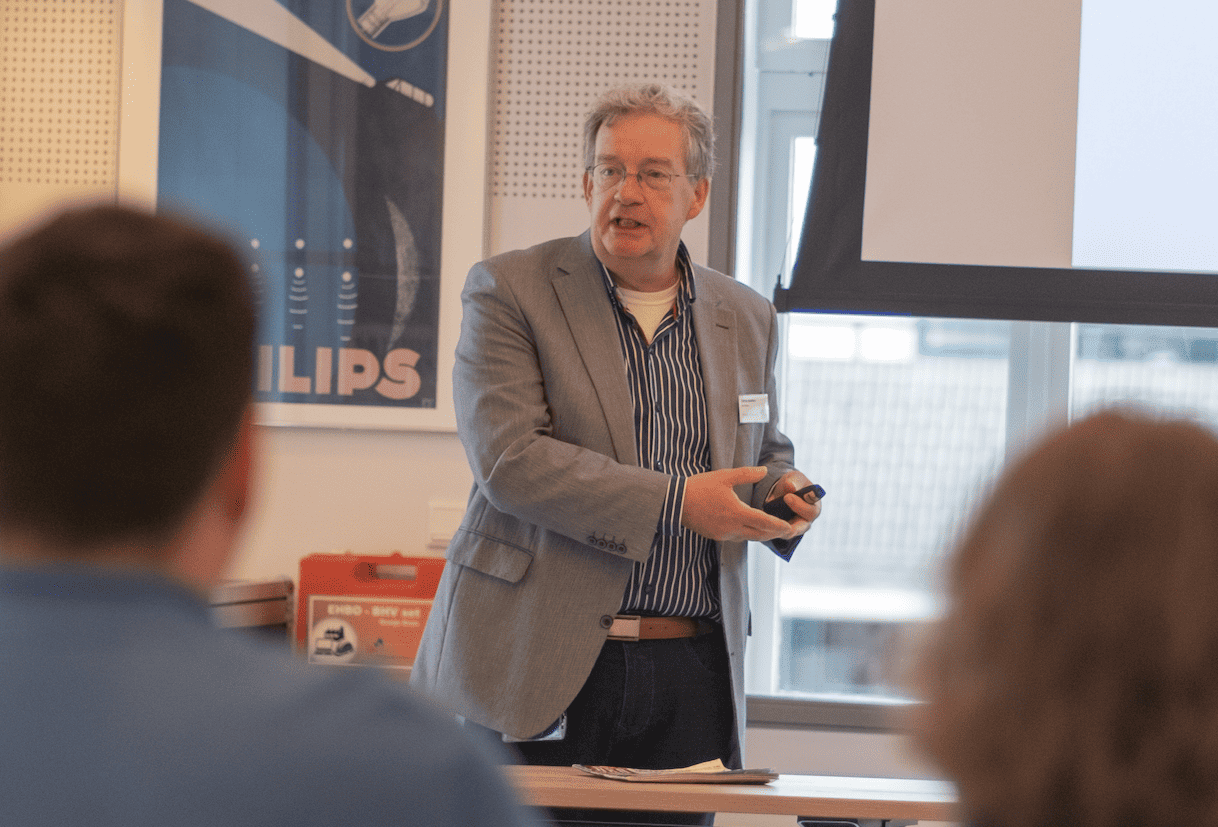
The lecture ‘Data for Dummies’ given by technology philosopher Tsjalling Swierstra begins fifteen minutes later this Thursday evening. The hall in retirement home Eerdbrand where the lecture on the (im)possibilities of big data would take place, actually still is occupied. The billiards tournament is not over yet. Another, much smaller, parlor offers a solution.
The lecture is organized by Het Nieuwe Instituut, which is hired by the municipality to help Eindhoven become a smart society through the ‘Stae of Eindhoven’ program. Program Leader Linda Vlassenrood explains why the venue is at a nursing home: “We could have done this in the Van Abbemuseum, but we really want it to be in the midst of society. That’s why we’re here.”
Under the title “The State of Eindhoven” E52 brings a series of articles about the effort the city is taking to become a smart society, and about the connections that are needed between big data and real people. Read the whole series here.
A total of 20 concerned citizens have managed to find their way to the retirement home. A photographer is walking around and shoots his snapshots. There are still some empty seats. Having moved to a smaller room wasn’t so bad after all. The possibilities and pitfalls of big data are, apparently, only of interest to a small group of local residents. Even when just about everyone has to deal with big data in some way.
Swierstra puts away the microphone, he doesn’t need one here. “Worldwide, there are 2,3 billion gigabytes of digital information available on a daily basis,” the professor begins his argument. “Sensors in public spaces such as cameras collect a lot of data. Data that can be used to better regulate things in the city. For example, traffic or public safety.”
Data are not only mined in the public domain. Social media, websites and all sorts of phone applications continuously collect data about people. “Combining all these data enables pattern recognition”, Swierstra says. “Therefore, anonymous data is actually an illusion.”
A company or government agency may anonymise data, but combined with other data “de-anononymising’ is also possible. “These data are therefore worth a lot of money.” In fact, those who use a free service like Google pay with their data.
“Companies like Google and Apple are currently best in analysing all the data,” Swierstra continues. “Even universities and hospitals have their data analysed by them.”
A person in the audience responds: “The biggest companies in the world take possession of our data and the politicians do nothing about it.” The photographer stands up, gets his camera in position. “Please don’t take any pictures. I haven’t given permission and we are in a private room”, says the elderly, gray-haired man.
“I’m nowhere to be found on the internet and want to keep it that way.”
He wants to remain anonymous. “I’m nowhere to be found on the internet and want to keep it that way. My data are mine and nobody else’s.” The man tells that he bought his first PC in the early 1980’s. He has closely monitored all the technical progress since then. Now he is retired and has even more time to keep track of all developments. “The government can do little. You simply cannot forbid people to share their data.”
The observation of the old man hits to the heart of Swierstra’s lecture: “Digital information is like a picture of a regretful activity during one’s younger years: it will never go away.”
And there’s a lot more to think of when you consider what one can do with data. “What if you can’t buy certain products because data suggest that you can’t handle money well? Or what if police would preventively go to certain neighbourhoods because the data suggest that the risk of violence there is greater than elsewhere? Could that give somebody a stigma for no reason or even get someone arrested before anything has happened?” Not to mention data being hacked by intruders.
“The reality is we do not know where it is going with big data.”
Swierstra’s conclusions can hardly be ignored: “The reality is we do not know where it is going with big data.” Compare it to the Internet. Everyone thought the web would have a democratising effect. A sort of digital town square for debate. “But now everyone runs away from Twitter because it has become such a sewer.”
That uncertainty, however, is always present in innovation. Whether this is sufficient reason to fear the rise of big data is the question. One thing is absolutely clear after the lecture: think twice before you share your data.








